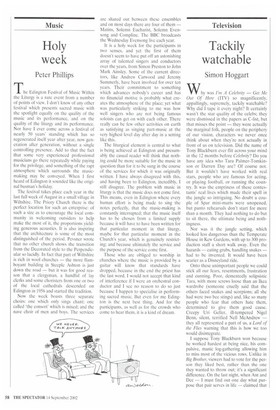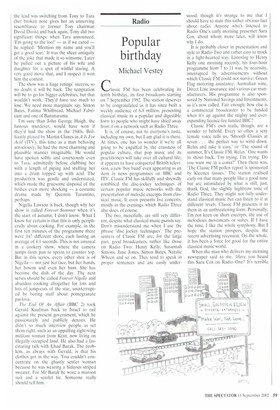Television
Tackily watchable
Simon Hoggart
Why was I'm A Celebrity — Get Me Out Of Here (ITV) so magnificently, appallingly, supremely, tackily watchable? Why did I tape it every night? It certainly wasn't the star quality of the celebs; they were dismissed in the papers as C-list, but that misses the point — they were actually the marginal folk, people on the periphery of our vision, characters we never once think about when they're not actually in front of us on television. Did the name of Tony Blackburn ever flit across your mind in the 12 months before Celebrity? Do you have any idea who Tara Palmer-Tornkinson or Darren Day are? Of course not. But it wouldn't have worked with real stars, people who are famous for acting, or playing football, or running the country. It was the emptiness of these contestants' real lives which made their spell in the jungle so intriguing. No doubt a couple of Spar mini-marts were unopened, but panto rehearsals don't start for more than a month. They had nothing to do but to sit there, the ultimate being and nothingness.
Nor was it the jungle setting, which looked less dangerous than the Temperate House in Kew Gardens, with up to 300 production staff a short walk away. Even the hazards — eating grubs, handling snakes — had to be invented. It would have been scarier as a Disneyland ride.
Onto these unimportant people we could stick all our fears, resentments, frustration and cunning. Poor, dementedly solipsistic Tara, with more screws loose than an Ikea wardrobe (someone cruelly said that the others faced snakes and scorpions; all she had were two bee stings) and, like so many people who fear that others hate them, determined to give them good cause. Creepy Uri Geller, ill-tempered Nigel Benn, silent, terrified Nell McAndrew — they all represented a part of us, a Lord of the Flies warning that this is how we too would disintegrate.
I suppose Tony Blackburn won because he worked hardest at being nice, his compulsive, manic log-gathering allowing him to miss most of the vicious rows. Unlike in Big Brother, viewers had to vote for the person they liked best, rather than the one they wanted to throw out; it's a significant difference. On the last night, when Ant and Dec — I must find out one day what purpose that pair serves in life — claimed that
the lead was switching from Tony to Tara (her broken nose gives her an unnerving
resemblance to former Tory chairman David Davis) and back again, Tony did two significant things: when Tara announced, `I'm going to the loci!' — as if we cared — he replied: 'Mention my name and you'll get a good seat.' It was the sheer antiquity of the joke that made it so winsome. Later he pulled out a picture of his wife and daughter for a spot of wistful staring. A very good move that, and I suspect it won him the contest.
The show was a huge ratings' success, so no doubt it will be back. The temptation will be to go for bigger celebrities, but that wouldn't work. They'd have too much to lose. We need more marginals: say, Simon Bates, Fatima Whitbread, Michael Fabricant and one of Bananarama.
I'm sure than John George Haigh, the famous murderer, would have won if they'd had the show in the 1940s. Brilliantly played by Martin Clunes in A Is For Acid (ITV), this time as a man behaving atrociously, he had the most charming and plausible manner imaginable. He would have spoken softly and courteously even to Tara, admittedly before clubbing her with a length of piping and stuffing her into a drum topped up with acid. The production was gentle and understated, which made the gruesome disposal of the bodies even more shocking — a costume drama made by Quentin Tarantino, perhaps.
Nigella Lawson is back, though why her show is called Forever Summer when it's the start of autumn. I don't know. What I know for certain is that this is only peripherally about cooking. For example, in the first ten minutes of the programme there were 147 different shots, each lasting an average of 4.1 seconds. This is not unusual in a cookery show, where the camera jumps from pan to spoon to counter top. But in this series, every other shot is of Nigella — not just her face, but her hands, her bosom and even her bum. She has become the dish of the day. The next series should be called Forever Nigella and abandon cooking altogether for lots and lots of jump-cuts of the star, uninterrupted by boring stuff about pomegranate pavlova.
The End Of An Affair (BBC 2) took Gerald Kaufman back to Israel to rail against the present government, which he passionately and publicly detests. He didn't so much interview people as set them right, such as an appalling right-wing militant woman from Kent, now living on illegally occupied land. He also had a fascinating talk with Ehud Barak. The problem, as always with Gerald, is that his clothes got in the way. You couldn't concentrate on the ghastly settler woman because he was wearing a hideous striped sweater. For Mr Barak he wore a maroon suit and a scarlet tie. Someone really should tell him.











































































 Previous page
Previous page